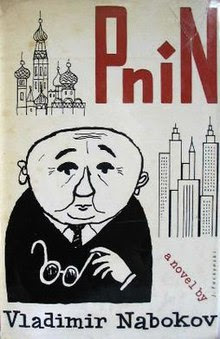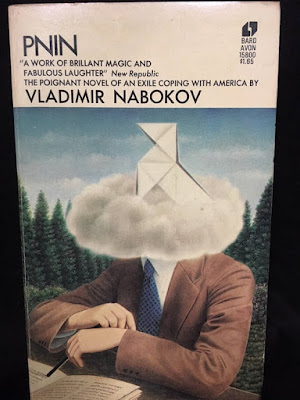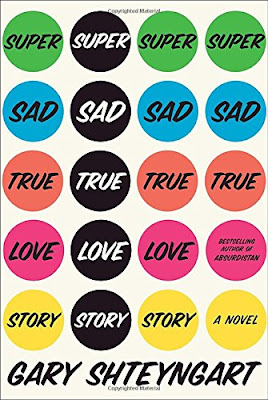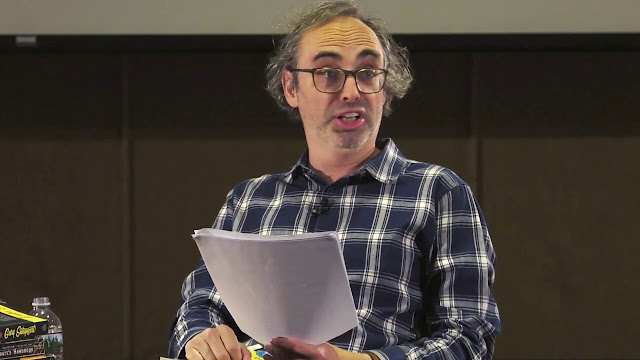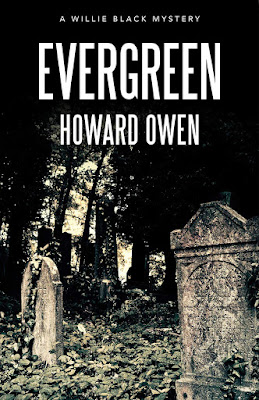I’ve been making the mistake
lately of reading professional reviews after reading the book rather
than before. This despite knowing that reading reviews in advance of
the book gives me insight that enhances my appreciation of the
book—which is one reason for publishing reviews in the first
place. The main reason, of course, the one directly related to
publishers sending reviewers free “review copies,” is
to help sell the book. So what in hell am I doing writing this review
sixty-six years after Pnin,
was published? Did the publisher’s free review copy get lost in the
mail for more than half a century? Well now waitaminute, weren’t
those the Pony Express days? Maybe the damned thing’s still
bouncing around in a saddlebag out on a prairie somewhere in
Nebraska. I mean, if so, it shouldn’t be held against me if
I couldn’t wait any longer. I’m a patient man, but...there are
limits! So I downloaded the Kindle version, costing me, btw, probly
six times what I’d have had to pay had I bought it back in those
Bill Codyish days of yore. Was I what? Alive that long ago? Well now
hey, some cards a reviewer’s allowed to keep face down,
n’est-ce-pas?
[rhetorical question--move along, please!]
Anyway, not all is lost. There
are advantages to reading a review by a reviewer who’s literally
been left in the dust. Same as there are, say, to buying a
road-gripping Armstrong tire, created eons after the original log
wheel rolled away from its inventor’s flint adze. In the situation
of Pnin, the reader has instant online access to the insights
of top-line literary critics, which, by my failing to deepen my
appreciation of this short, classic novel by first reading them, and
which, by my coming to them after the fact, humiliated my intention
of doing a proper review for you here, have unwittingly freed me to
narrow my focus to only one facet of Vladimir Nabokov’s break-out
American literary achievement. That one facet, which counterbalanced
the ungainly, gentle, laughingstock
persona of Timofey Pnin—pronounced Pun-in by Pnin in the
novel, but which one reviewer has insisted is P’neen--the,
Soviet Union escapee-cum-teacher of Russian literature. The one
saving grace: tragic romance. Yes, that resonantly soulful
Russian literary tradition. Pnin’s Mira plucks the balalaika
heartstrings with a poignancy on a par with Zhivago’s Lara.
“In order to exist
rationally,” our anonymous narrator tells us, “Pnin had taught
himself, during the last ten years, never to remember Mira
Belochkin—not because, in itself, the evocation of a youthful love
affair, banal and brief, threatened his peace of mind (alas,
recollections of his marriage to Liza were imperious enough to crowd
out any former romance), but because, if one were quite sincere with
oneself, no conscience, and hence no consciousness, could be expected
to subsist in a world where such things as Mira’s death were
possible.”
The slightest reminder of his
long-lost Mira, in the midst of giving a speech, for example, can
divert him into a split-second reverie of a past encounter.
Our narrator, who
incrementally reveals his acquaintance with Pnin from childhood,
mentions his first sighting of Mira at an amateur play some
youngsters, including Pnin, held in an old barn. Without naming her
then, he remembers her as a “pretty, slender-necked, velvet-eyed
girl,” the sister of a mutual acquaintance.
Pnin last saw her in a Berlin
restaurant after she escaped the Soviet Union and before her arrest
by Nazis. “They exchanged a few words, she smiled at him in the
remembered fashion, from under her dark brows, with that bashful
slyness of hers; and the contour of her prominent cheekbones, and the
elongated eyes, and the slenderness of arm and ankle were unchanged,
were immortal, and then she joined her husband who was getting his
overcoat at the cloakroom, and that was all—but the pang of
tenderness remained, akin to the vibrating outline of verses you know
you know but cannot recall.”
He
learned years later, after escaping to the United States, that Mira
had been murdered
at Buchenwald.
More
recently, in one of his unbidden remembrances, musing at night alone
on a porch, “...again the clumsy, shy, obstinate, eighteen-year-old
boy, waiting in the dark for Mira—and despite the fact that logical
thought put electric bulbs into the kerosene lamps and reshuffled the
people, turning them into aging émigrés and securely, hopelessly,
forever wire-netting the lighted porch, my poor Pnin, with
hallucinatory sharpness, imagined Mira slipping out of there into the
garden and coming toward him among tall tobacco flowers whose dull
white mingled in the dark with that of her frock...
“Pnin
slowly walked under the solemn pines. The sky was dying. He did not
believe in an autocratic God. He did believe, dimly, in a democracy
of ghosts. The souls of the dead, perhaps, formed committees, and
these, in continuous session, attended to the destinies of the
quick.”
While
Mira lives
in his heart, Pnin marries
Liza, a restless temptress who doesn’t
hang around long. His
sense of her as he watches her leave is a mixture of reluctant
acceptance and relief:
“He
saw her off, and walked back through the park. To hold her, to keep
her—just as she was—with her cruelty, with her vulgarity, with
her blinding blue eyes, with her miserable poetry, with her fat feet,
with her impure, dry, sordid, infantile soul. All of a sudden he
thought:
If people are reunited in Heaven (I don’t believe it, but suppose),
then how shall I stop it from creeping upon me, over me, that
shriveled, helpless, lame thing, her soul? But this is the earth, and
I am, curiously enough, alive, and there is something in me and in
life—“
He
breaks down when his friend Joan, hoping to console him, asks softly,
“Doesn’t she want to come back?”
“Pnin,
his head on his arm, started to beat the table with his loosely
clenched fist. ‘I haf nofing,’ [he]
wailed...between loud, damp sniffs, ‘I haf nofing left, nofing,
nofing!’”
What
we
have is something marvelous. An all-too-human character brought alive
for us in all his dimensions by an enchanting writer, with the bonus
of an intimate look at a
small
college community of Russian émigrés
in the early 1950s portrayed with
precision, fictionally,
by one of their own. Nabokov is best known for Lolita,
his startling, controversial novel about a middle-aged man’s
infatuation with a 12-year-old girl. Pnin,
however,
was his break-out in U.S. literary circles, initially appearing as a
series of individual
stories in The
New Yorker.
Its success, establishing
his reputation as a writer of uncommon brilliance, helped persuade
publishers to take a chance with the more risky Lolita.
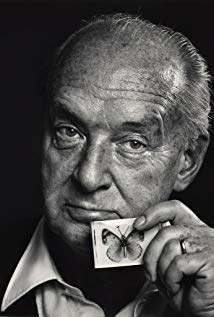 |
| Vladimir Nabokov |
Below
are links to a couple of comprehensive reviews of Pnin:
Charles
Poore, The
New
York Times
